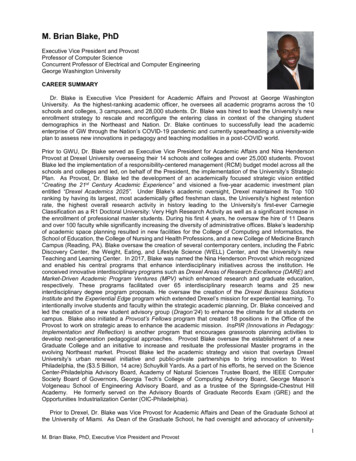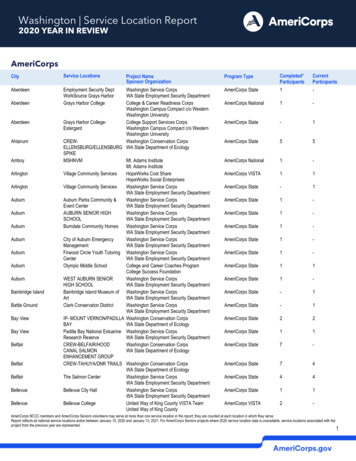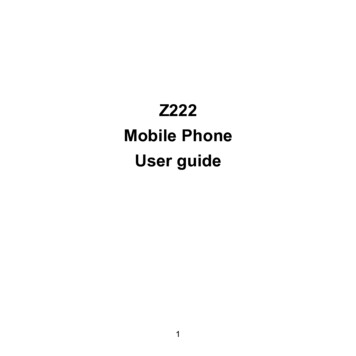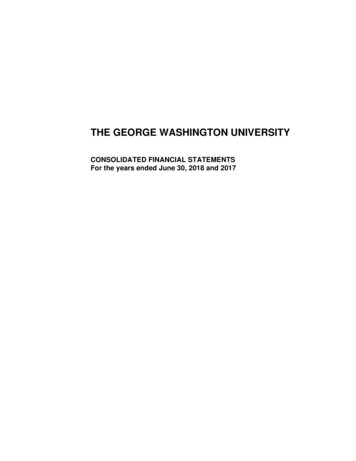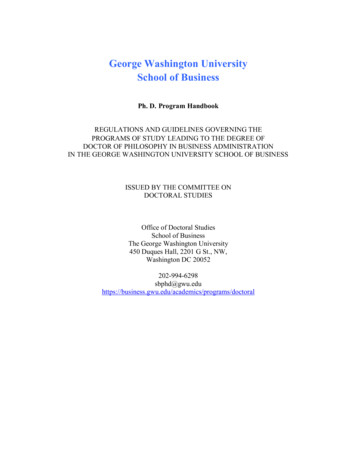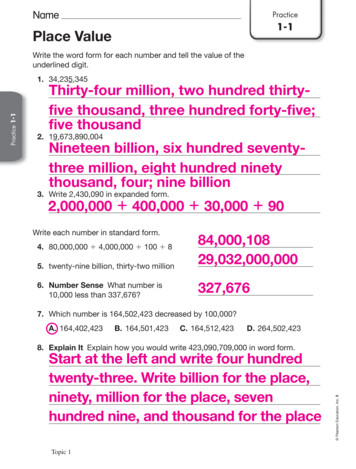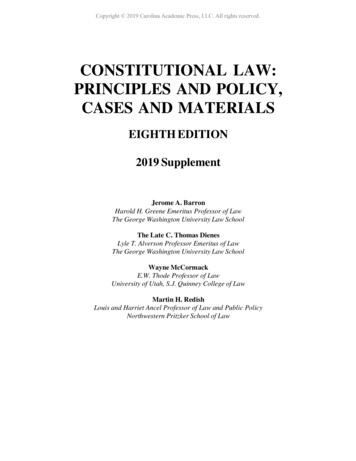
Transcription
MORIKey to Exem1. Executive Order 1section(b)( 1)2. Executive Order 13 526 section 3 .3 (b)( 6)3. Central Intelligence Agency Act of 1949 (50 U.S.C., section 403g)4.5.6.7.5 U.S.C.5 U.S.C.5 U.S.C.5 U.S.C.section(b)(3), the Freedom oflnformation Actsection 522 (b)(6)section 522 (b )(7)(C)section 522 (b)(7)(E)DECLASSIFIED UNDER AUTHORITY OF THE INTERAGENCYSECURITY CLASSIFICATION APPEALS PANEL.E.O. 13526, SECTION 5.3(b)(3)IS CAP2. 0 01- 0 \ '!;) document-
:1DIRECTOR OF CENTRAL INTELLIGENCEForeign Denial and Deception Analyaia CommitteeWashington, o:c;30 October 1987fm JTHE JONATHAN JAY POLLARD ESPIONAGE CASE:A DAMAGE ASSESSMENTStudy Director:II -------------------------- WARNINOTICEINTELLIGE SOURCES ANDMETHODS INV VED/ S/3
rID:46933PrefaceThis study, undertaken byjthe Foreign Denial and Deception lysisCommittee(DDAC} tJthe direction of the Director ofCentral Intelligence, is one of two assessments of a . Q. a result of Jonathan Pollard's espionage on behalf of1984-BS, which are being issued almostsimultaneously.The other is an assessment prepared for theDepartment of Defense by the Office of Naval Intelligence and theNaval Investigative Service, Naval Security and InvestigativeCommand, where Pollard was employed during his espionage career.The principal drafters consulted closely during preparation of thetwo studies.Although they differ somewhat in detail and emphasis,there is mutual agreement concerning their findings.yt. .The Study Director gratefully acknowledges the valuapleassistance of contributors from throughout the IntelligenceCommunity to the project.J1 ,77
4.J7L -:[p···DIRECTOR OF CENTRAl INTELLIGENCE\Foreign Dental and Deception Analyala CommitteeL--/Washington, D.C. 20505The Jonathan Jay Pollard Espionage Case:A DamageAssessment .Executive Summary1.Jonathan Pollard's short but intensive espionage career onbehalf of Israel lasted from June 1984 until his arrest on 21November 1985.He pleaded guilty to conspiracy to commit espionageon 5 June 1986 and was sentenced to life imprisonment on 4 Mar.ch1997.Following his guilty plea, which arose from a plea bargain,Pollard cooperated with US Government investigators, includingofficials of the Intelligence Community.debriefings of Pollard, aidedExtensive post-pleaby -------------j1 1 lareview of document-receipt records, yielded an extensive account ofPollard's espionage objectives, activities, and compromiseddocuments.A series of polygraph interviews tended to confirm thathis cooperation with US authorities was bona fide.lyg ---- 3-- -- Personal History and Espionage Career2.Although Pollard was regarded by his former collegeprofessors and colleagues in naval intelligence as a capable--ifeccentric--scholar and intelligence analyst, his personal andemployment history is replete with incidents of irresponsib,lebehavior that point to significant emotional instability.For
rl4example, although Pollard earned a 3.5 grade point average as aStanford undergraduate from1972-76 former student acquaintancestold investigators that he bragged about his role as a Mossad agentand, on one occasion, waved a pistol in the air and screamed thateveryone was out to get him.Pollard's fantasies regardinginvolvement with clandestine US and Israeli intelligence operationscontinued during his emp1oyment with US naval intelligencejfrom1979 to 1985.3.iii1.- ----J13 1 1)Another factor inPo ard'sbackground was his persistentand growing determination to assist Israel, either by emigrating tothat country or by other means, which eventually meant espionage.In his first Memorandum in Aid of Sentencing following his arrestand guilty plea, Pollard claimed that he had begun dreaming aboutfuture emigration to Israel at age 12 when that country won adramatic victory in the six-day war of June 1967.According toPollard, another influence was his attendance in the summer of 1971at a three-month science camp in Israel, which featured strongencouragement to emigrate.During the pre-espionage period ofPollard's employment with naval intelligence, he claimed hedeveloped a strong perception of anti-Israeli attitudes among hiscolleagues and of inadequate US intelligence support for Israel. 0 3 14.Despite his emotional and behavioral difficulties, Pollardmanaged to gain the respect of most of his superiors, as evidencedby his achievement of promotions from GS-07 to GS-12 over a sixyear period.Pollard's success rested upon an academic backgroundthat included graduate study at the Fletcher School of Law and :::ET I[!]iv27
[4Diplomacy, Tufts University, upon his considerable skills as ananalyst, and upon deficiencies in administrative procedures andrecord-keeping--since rectified-jthat allowed Pollard to changejobs without adverse aspects of his past performance coming to ther-----------. attention of his new5.According to Pollard'he eagerly seized an opportunity tovolunteer his services to Israeli intelligence in late June 1984.At that time, Pollard met his initial Israeli handler, Col. AviemSella--a noted fighter pilot on study leave in the United States-through a pro-Israeli activist, who was an old friend of thePollard family.Pollard passed classified material to Sellaconcerning military developments in several Arab countries duringat least three meetings, June-August 1984./sessions in Paris in November 1984. Here, Pollard met RafaelEitan, advisor on counterterrorism to Prime Minister Shamir and thesenior Israeli in charge of the case, as well as Joseph Yagur,Counselor for Scientific Affairs at the Israeli Consulate in NewYork, who immediately replaced Sella as Pollard's direct handler.Pollard's initial monthly salary of 1,500 was agreed upon inl JI -- -- -- Pollard in 1978 had been rejected for aCIA Graduate Fellowship owing to his admission, I,.-------------------- ,and recent use of marijuana.!IIVfl J3 l 1-----rl I
MORI DociD: 1 463Paris, as was the main objective of the operation as outlined byYaqur--to provide Israel with the best available US intelligence onIsrael's Arab adversaries and the military support they receivefrom the Soviet Union.Eitan emphasized that Pollard should resignfrom naval intelligence rather than undergo a polygraphexamination; we assume that Pollard at some point told the Israelisthat his application for a graduate fellowship had been rejected byCIAI7.; After returning from Paris,/Pollard shifted his espionageinto high gear.Beginning in/late January 1995, he made large'biweekly deliveries of classified material, on every other Friday,to the apartment of Irit Erb, a secretary at the Israeli Embassy inWashington.Pollard recalled that his first and possibly largestdelivery occurred on 23 January and consisted of five suitcasesfull of classified material, and that he maintained the biweeklyschedule--interrupted onlybY a second operational trip abroad--until his arrest in November 1995.Pollard also met Yagur at Erb'sapartment on the last Saturday of each month to discuss additionaltaskings and the value of the intelligence he delivered.Pollardrecalled that Yagur on at least two occasions indicated thatselected items of his intelligence were known and appreciated by"the highest levels of the Israeli Government."salary was raised to 2,500 nPollard's monthlyFebruary 1995 in appreciation forhis productivity; and he/made a second operational trip to meet hisIsraeli handlers in Tel Aviv in July-August 1995.a. d:D: :JBy the fall of 1995, Pollard's Navy supervisor had becomesuspicious of his activities because Pollard seemed/to be handling !: !] p U1 ::::::::: : !!l
l'!ORI1343:3large amounts of classified material concerning the Middle East andunrelated to Pollard's legitimate duties, which concerned NorthAn investigation ensued thatAmerica and the Eastern Caribbean.led to Pollard being questioned by FBI and NIS officials beginningon 18 November andJarrested on 21 November after an unsuccessful -----------'effort to gain asylum at the Israeli Embassy.9.j ShJ JDuring post-arrest debriefings, Pollard said that if hisespionage had remained undetected, he would have been inclined toseek a job with the State Department's Bureau of Intelligence andResearch because he would not have been required to undergo apolygraph and major intelligence products were readily availablethere.He also indicated he could have. assumed a less risky roleas an agent of influence at State.Ic.J1[3]Israeli Espionage Motives and Classified Materials Received10 . . Given Israel's challenging security problems over thepast .40 years,Israeli intelligence officials have put intoIvigorous practice their belief that!1j1IIn theaftermath of Israel's pyrrhic military victory in Lebanon in 1982,representatives of the Israeli Government, defense forces j1l!expressed concern about a potential erosion1owing to Israeli economicdifficulties and a robust, Soviet-sponsored Syrian military-. 1 @J t ------------------------
11.According to Pollard, the Israelis submitted thefollowing collection requirements, in descending order of priority,to Pollard:--Arab (and Pakistani) nuclear intelligence)--Arab exotic weaponry, including chemical andweapons;--soviet aircraft;--Soviet air defenses;--Soviet air-to-air missiles and air-to-surface missiles;and--Arab order-of-battle, deployments, readiness, LJ!l] Eitan provided additional tasking for -- -----LCJ ---------------- material reporting "dirt" on Israeli political fiqures, any·information that would identify Israelio ficialswho wereproviding information to the United States,12.We believe that Pollardlresponded effectively to thegeneral Israeli taskings, but that he himself exerted the strongestinfluence on what was compromised by virtue of his own access,interests, and collection initiatives.US investigators, with
DociD:1 4Pollard's assistance, identified the following categories andapproximate numbers of compromised published documents, plus anestimated 1,500 current intelligence summary messages:Special compartmented information (SCI)Top Secret, non-codewordSecret, non-codewordConfidentialUnclassified and unknown classification800.vr I3 I1Jsraeli Intelligence Gains13.1/933
ID:14.'*In our view, Pollard's stolen materialLosses and vulnerabilities:15.1SecurityThe unauthorized disclosure to the !sraelisofsuch alarge and varied body of classified material poses risks of severalkinds to US intelligence sources and methods, analyticalcapabilities and intelligence exchanges, and foreign-policyinterests, including the possibility of extended compromise of someof Pollard's material to third countries,--Sources and Methods.Analysis of the informationreceived from Pollard would be a routinecounterintelligence function performed by the rsraeliintelligence and security services.We believe the
I[!]l--Analytical Ca:Qab:l,li ties and Intelligence Exchanges.[!]
l693--Foreign Policy Interests . \ Pollard's role in providingIsrael with intelligence that assisted its planning forthe 1985 raid on PLO headquarters near Tunis\--Extended Compromise of Pollard's material to third )countries.I[!]I ---------------------------------------------- -- 71
MORIID4 933IJ
316.Pollard's espionage has put at risk\important USintelligence and oreiqn-policy interests.Jl ]3II17. \'still, without discounting th s eotential or serious,.--------llong-term damage rom Pollard's espionage,II
4 933)Lessons Learned18.The DCI's Foreign Denial and Deception·Analysis Committeehas commissioned a separate paper, to be published in the spring of1988, on the counterintelligence and security lessons learned fromthe Pollard and four other recent espionage cases--those of LarryWu-tai Chin, Pelton, WalkerjWhitworth, and Howard.Among the mostimportant lessons unique to the Pollard case is that vigilance mustbe maintained j19.7 Lessons from previous damage assessments and security,.---------'studies that were reinforced by our findings in the Pollard caseinclude (Tab III, pp.S-9):--Utility of the polygraph as a deterrent to espionage;I
l\10RTD:3-Need to complete background investigations beforegranting access to sensitive intelligence;-Need for management awareness of employee behavior andfor completeness and availability of employees' personnelrecords; and-Need to devote additional resources to computer security.Key to Exemptions1. Executive Order 13526 section 3.3 (b)(l)2. Executive Order 13526 section 3.3 (b)(6)3. Central Intelligence Agency Act of 1949 (50 U.S.C., section 403g)4.5.6.7.5 U.S.C.5 U.S.C.5 U.S.C.5 U.S.C.section 522 (b)(3), the Freedom ofinformation Actsection 522 (b)(6)section 522 (b)(7)(C)section 522 (b)(7)(E)3
The Jonathan Jay Pollard EspioA Damage AssessmentteTable of ContentsPagePreface .iiExecutive SummaryiiiTable of Contents . xviiI.Introduction .1II.Background:3A.B.C.D.E.F.Personal History and Espionage CareerPersonal Hi story . . . . . . . . . . . . . . .Navy Employment and Descent toward Espionage .Contact, Assessment, and Recruitment, 1984Espionage in High Gear, January-November 1985Detection and Apprehension . . . . . . . . . .Debriefinqs, Legal Disposition, and PublicityIII. Inventory Profile--Classified Material Sought andStolen . . . . . . . . . . . . . . . . . .A.Israeli Intelligence Motives, Priorities, andB.Regue sts . . . . . . . . . ; [TJc.Overview of Compromised Materia. .1.47142125273131I 434446474748484949492.3.4.5050Current Intelligence, etc . . . . . . . . . . .515152A.53B.58 ------------T-Q p § E C I 3m .----- .------------------------
MORI DociD: 13933Table of Contents. cont.v.Losses and Vulnerabilities: Damage to US NationalSecurity . . . . . . . . . . . . . . . . . . . .A. Intelligence Sources and Methods . . . . . . . clusions . . . . . .A. The Bottom LineB. Damage Limitation8282c. '-------------------- '1 ------ Selected Bibliography839487BoxesPollard's Assignments and Security-ClearanceActions wtih Naval Intelligence, 1979-85Israel's Intelligence and Security Services1.2.8343.5411I1.QJ.2.3.I146a46b46cTabsTab ITab IITab IIITab IVTab VJonathan Pollard: A Chronology of Events . . . . . I-1.II-1Annotated Examples of Compromised DocumentsSecurity and Counterintelligence Lessons Learned III-1Terms of Reference. . IV-1Contributors . . . . . . . . . . . . . . . . . .V-1· .-r :.,.T O P S b C AF-';-- ,./. .; .; .;
The Jonathan Jay PollardEspionage Case: A Damage Assessment1. Intro uction1.In March 1986, the National Security Council Staffasked the Director of Central Intelligence to commiaioncomprehensive damage assessments of espionage cases that haveoccurred since 1980 (NSC/lCS 40102, dated 19 March 1986).Amongthe cases to be addressed was that of Jonathan Jay Pollard, anemployee of the Navy Field Operational Intelligence Office(NFOIO) and other components of naval intelligence from September1979 until November 1985.The DCI directed that this effort beundertaken by the Foreign Denial and Deception Analysis Committee(DDAC).This study results from the collection of all availableinformation on the Pollard case, and represents an assessment ofthe overall damage to national interests and to the Intelligence(.SjCommunity.2.j3IJonathan Pollard's short but intensive espionagecareer on behalf of Israel lasted from June 1984 until his arreston 21 November 1985.He pleaded guilty to conspiracy to. commitespionage on 5 June 1986 and was sentenced to life imprisonmenton 4 March 1987.Following his guilty plea, which arose from aplea bargain, Pollard cooperated with US Governmentinvestigators, including officials of the Intelligence Community,who were examining the extent of his damage to the nationalsecurity of the United States.of Pollard, aided byExtensive post-plea debriefings. I------ll!JJ-------'1 and1TOPSECRKI []review of [------------------------------
document-receipt records, yielded an extensive account ofPollard's espionage objectives, activities, and compromiseddocuments.A series of polygraph interviews conducted to monitorthe veracity of Pollard's debriefing statements tended to confirmthat his cooperation with US authorities was bona fide. ) [2 -----
II.Backqround:4.Personal History and Espionage CareerJonathan Jay Pollard's intensive, 17-monthespiona ge campaign on behalf of Israel resulted in the loss ofmore th anUS classified documents and messages.Pollardconcent rated on providing Israel with US intelligence on themilitar y forces and equipment of Arab and Islamic states and onSoviet military forces, equipment, and technology.Judging from Pollard's post-arrest statements andwriting s,2 he has tried to justify or rationalize his espionageas an e ffort to help a beleaguered Israel so that it would "winthe nex t war" against the Arabs.The Intelligence Communitybelieve s the Israelis readily would accomplish that objectivewithout Pollard's stolen intelligence:2 In addition to the extensm·oat-arrest debriefings he gave toand Naval Investigative Service,inveeti gators from the FBI, 1-t e-record interview to journalistPollard granted a detailed,Wolf Bli tzer, and submitted two Memoranda In Aid of Sentencing,totaling 107 pages, to presiding Ch Aubrey E. Robinson,Jr., of the US District Court. 3--r--3 -------------------------------, --------------T-o P s t e T --------------------------
A.Personal History5.Jonathan Jay Pollard's childhood and adolescencewere marked by material sufficiency, strong intellectualstimulation within a closely knit family, and some bruisingexperiences as a member of. the Jewish-American minority growingup in Middle America.Born as the youngest of three children toMorris and Mildred Klein Pollard on 7 Auqust 1954, JonathanPollard spent his early childhood in Galveston, Texas, and hisadolescence in South Bend,India a,where his father is aprominent virologist at the University of Notre Dame.The familyhas been strongly pro-American3 and also active in support of theState of Israel. 4Jonathan Pollard indicated that he feltethnically isolated in South Bend and was uncomfortable in anenvironment he perceived to be strongly anti-Semitic.5 [ff]tlE](4 In a Memorandum in Aid of Sentencing, Pollard wrote that "thefirst flag I could recognize in my early youth was that of Israeland for years our family took quiet pride in my late uncle'sdecision to provide the fledgling Israeli Army in 1948 withmilitary boots and medical supplies "liberated" from the AmericanHospital in Paris, which he commanded at the time." Pollard alsostates in the memorandum, "my parents never ceased in theirefEltt Jrtray this land fUSA] . as a Godsend for Jews . " 3.5 In the same memorandum, Pollard related that "the firstindication I had that life would be an agonizing struggle betweencompeting values rather than one of coherent academic absolutesoccurred when my family moved to Indiana, where I suddenly foundmyself confronting a community in which racism and bigotry wereacceptable social practices . ! was never able to establishfriendships in my neighborhoods and was compelled to spend mostof my time around the city's Hebrew Day School, where I felt atleast physically safe and emotionally prot·ected. rry5jQ34. c: EJ / .TOPSECRB'r/ I
MORI6.Pollard indicated that he already had begunfantasizing about future emigratipn to Israel when that state wona dramatic victory in the six-day war of June 1967.This eventevidently made a lasting impression upon him; from then on heincreasingly considered emigrat'ion to or other means to assistIsrael.Another influence was Pollardrs attendance in the summerof 1971 at a three-month science camp in Israel, sponsored by theWeizman Institute, which featured patriotic field trips andstronq encouragement for young Jewish-Americans to emigrate toIsrael.csl l3 I7.Pollard'sattendance atStanford University from1972-76 was marked both by significant academic achievement andsigns of emotional instability.On the one and,he graduatedwith a B.A. in political science, emphasizing national-securitystudies, with a grade point average of 3.5.On the other hand,after Pollard's arrest, former Stanford acquaintances allegedthat he was involved in several bizarre incidents.They, forexample, claim that he told them he worked for the Israeliintelligence service, Mossad, and was being groomed to work forit within the United States Government.On another occasion,Pollard waved a pistol in the air and screamed that everyone wasout to get him.8.{ Throughout his time at Stanford, Pollard apparentlyretained a fixation on emigrating to Israel or providing otherdirect assistance to Tel Aviv.work on a kibbutzdu ingHe claims to have volunteered tothe Yom Kippur War in 1973 as part of aprogram to permit Israeli men to be transferred from the
kibbutzim to the war fronts.6Pollard indicates he decided atthat time that the intelligence field would provide him with askill9.Pollard followed a circuitous path from stanford tothe US Intelligence Community.He attended Notre Dame Law Schoolfrom September to November 1976 and Indiana University fromJanuary to May 1977.He then was enrolled in the Fletcher Schoolof Law and Diplomacy, Tufts University, from September 1977 untilAugust 1979.While at Fletcher in early 1978, Pollard appliedunsuccessfully for CIA's Graduate Fellow program.Although hisacademic credentials were impressive? and .most of the referencesinterviewed for his background investigation commented favorablyupon his character and qualifications, Pollard, admitted extensive. and recent use of marijuana ---------- 1-- '------------ jtherebydisqualifying himself for CIA employment.In the spring of 1979,while still at Fletcher, Pollard successfully applied foremployment with the Department of .the Navy, 1 ---------------- Although Pollarddid not receive the Master's degree, he began work as anIntelligence Research Specialist assigned to the Naval Ocean6 Pollard claims in his first Memorandum in Aid 'of Sentencingthat his volunteer group spent five frustrating days waiting foran El Al flight in Los Angeles before being told the need for ad passed with Sharon's crossing of the.Suez Canal. V( 7 I !classified him as a"temperamental geniuslind a gifted person who worked at his ownpace and would on d to people he felt were of equalintelligence. (.8'3)6 [ /
Surveillance Information Center (NOSIC} of the Navy FieldOperational Intelligence Office in September 1979.B. YY Em loyment10.andDesc ntTowardEs iona Pollard's job performance and personal behaviorvaried markedly in the course of working for several componentsof naval intelligence from 1979-95.Most of his performanceevaluations were very positive and he was promoted from GS-7 toGS-12 during the period.Still, especially in retrospect,Pollard showed additional evidence of emotional instability andah obsess! on with helping Israel. 8 ·The following factors that have come to light about,hiaemployment with the Navy indicate that Pollard was unsuited foraccess to sensitive. national security information:--Falsecl imsconcerning professional qualifications.Pollard falsely stated on his naval employment applicationthat he had a "provisional" M.A. degree from the FletcherSchool of Law and Diplomacy.Moreover, in February 1980during an interview with Task Force 168, the intelligenceelement charged with HUMINT collection, Pollard falselyclaimed to have an M.A. degree, to be proficient inAfrikaans, and to have applied for a commission in the naval[fJ[fJ8 After Pollard' a arrest, Iobserved that Pollard's sometimes strange behavior-including, inter alia, the telling of bizarre stories about hisadventures as a CIA agent in Syria and being captured andtortured by Syrian authorities--had taken on new importance afterhis discovery and arrest, but noted further that the mostimportant thing known about Pollard before his arrest was that hewas an intelligent, energetic, and often productive analyst whosefaults could be overlooked in light of his obvious value to thecomponents to which he was assigned.(S ·
reserve.Pollard made another, more farfetched statement tohis immediate supervisor in NOSIC:he said he had key SouthAfrican contacts who could provide him with valuable.information, and that he had known South African citizensfor many years because his father bad been the CIA StationChtef in South Africa. 9ysBOXPollard's Assignments and Security-Clearance ActionsWith Naval Intelligence, 1979-85September 1979Research analyst, Naval Ocean SurveillanceInformation Center, Suitland, Maryland(merchant shipping analyst and watchofficer).November 1979Interim Top Secret clearance granted.February 1980Volunteer to Task Force 168 (TF-168), thenaval intelligence .element responsible forHUMINT collection;Pollard was assigned tocollect information from a South Africandefense attache.April 1980Pollard temporarily reassigned to position inNaval Intelligence Support Center (NISC)-34that did not require access to SCI material,9 Pollard admitted I16flin July 1980that he had lied about his South Afrib-mli contacts in order toimpress others and enhance his professional status. 'I 8 EJ 3------- - , r: --------------------------
owing to reservations concerning hisemotional stability.May 1980Assigned as Middle Eastern warship analyst,Free World Branch, NISC-33; SCI accessreinstated.Auqust 1980Association with TF-168 terminated owing toevidence of gross unreliability andrecommendation by clinical psychologist thatPollard be assiqned to non-sensitive duties.Top Secret clearance and SCI accesssuspended; Pollard reassigned as researchship analyst, NISC-34, pending fitness forduty evaluation by one of four clearedpsychiatrists identified to Pollard byCommanding Officer, NISC.April 1981Psychiatrist diagnosed Pollard as having a. .l s .l .l butalsodeemed him "thoroughly capable of handlingthe duties of his job and not a securityrisk."The psychiatrist recommended furthertreatment, but Pollard did not seek orreceive any.January 1982Reinstatement of Pollard's Top Secretclearance and SCI access ordered byCommander, Naval Intelligence Command (NIC).February 1982Pollard returned from NISC-34 to assignmentas Middle East warship analyst in NISC-33.
33June 1984Began temporary duty with Anti-TerroristAlert Center (ATAC), Naval InvestigativeService (NIS); worked rotating shift aswatchstander.October 1984Permanently assigned to ATAC, NIS, as analystresponsible for assessing terroristactivities, narcotics traffic, andinstability in North America and EasternCaribbean.Remained in this assignment untilarrest.END ------------------ Adverse record with Task Force-168.Pollard repeatedlyviolated his instructions--for example, by attendingmeetings against orders and disclosing classifiedinformation without authorization--during his assignment tocollect intelligence on Soviet naval activities in the SouthAtlantic from a South African defense attache.Pollard'ssuperiors quickly deveioped misgivings concerning hiserratic behavior and then learned he had lied about hisqualifications and disclosed classified information to theSouth African attache without authorization.10, 11As a10 Although we are not certain of the extent ofunauthorized disclosures durin the TF-168 assi11 The TF-168 collection operation was converted to counterintelligence case "Operation swan Song," .under the auspices of10
3result of his unacceptable behavior, Pollard was examined bya clinical psychologist, who described Pollard as grandioseand manipulative.The psychologist felt that the risk ofunintentional compromise of information, but not espionage,by Pollard was high.He recommended therapy and assignmentDr )to nonsensitive duties.--Lifestyle Problems.Pollard experienced intermittentfinancial difficulties and behavioral problems, and thepost-arrest investigation turned up allegations of drugabuse.Pollard's rent check was returned owing toinsufficient funds in March 1993, and he was late payingrent due in December 1993, and March and April 1994.In May1994, he borrowed money from a co-worker and over the nextfew months bounced several checks attempting to repay it.In July 1994, a letter of indebtedness from the Navy FederalCredit Union reported that Pollard was delinquent inrepaying a 4,175.00 loan.Meanwhile, Pollard and hisfiancee Anne Henderson allegedly used marijuana and cocaineoccasionally at parties in the Washington area from 1982-84.In late 1993, an anonymous telephone caller informed a NISCofficial that Pollard had been observed i.n an altercation ina bar in Georgetown and had identified himself as anintelligence analyst during the incident.11.ft. ' In post-arrest debriefings, Pollard claimed thatwhat he perceived to be anti-Israeli attitudes among hisNIS, in July 1980, for the purpose of clarifying Pollard'sactivities. Operation Swan Song was terminated in early Augustfollowing Pollard's admissions, noted above, and a determinationthat further investigation would be unproductive. )'-r -- ---T-O P S E C . ffi T. . .11/7j
colleagues in naval intelligence contributed to his decision tocommit espionage for Israel.For example, Pollard claimed thatthe US delegation to a US-Israeli scientific and technologicalintelligence-exchange conference, which he attended in 1982,failed to follow established disclosure guidance by withholdinginformation releasable to Israe1.12Pollard also claimed heoverheard comments from US delegates that he viewed as eitheranti-Israeli or anti-Semitic.12.( 'L1iPPollard claimed that another key contributingfactor was his concern and frustration over the inadequate USreaction following the bombing of the US Marine headquarters inBeirut in october 1983.Pollard rationalized that if theusGovernment were unwilling to take effective countermeasures toprotect its own interests in Lebanon, then it might be unwillingor unable to provide Israel with adequate assistance· in t
DIRECTOR OF CENTRAl INTELLIGENCE \ Foreign Dental and Deception Analyala Committee / L--Washington, D.C. 20505 The Jonathan Jay Pollard Espionage Case: A Damage Assessment Executive . Summary 4 1. Jonathan Pollard's short but intensive espionage career on behalf of Israel lasted from June 1984 until his arrest on 21 November 1985.
